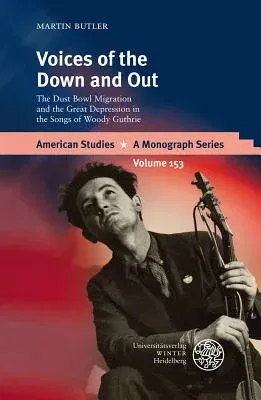Martin Butler
(Author)Voices of the Down and Out: The Dust Bowl Migration and the Great Depression in the Songs of Woody GuthrieHardcover, 1 January 2008

Qty
1
Turbo
Ships in 2 - 3 days
Only 4 left
Free Delivery
Cash on Delivery
15 Days
Free Returns
Secure Checkout

Part of Series
American Studies - A Monograph
Print Length
268 pages
Language
English
Publisher
Universitatsverlag Winter
Date Published
1 Jan 2008
ISBN-10
3825353672
ISBN-13
9783825353674
Description
Product Details
Author:
Book Format:
Hardcover
Country of Origin:
US
Date Published:
1 January 2008
ISBN-10:
3825353672
ISBN-13:
9783825353674
Language:
English
Location:
Heidelberg
Pages:
268
Publisher: